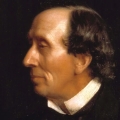
Which was the happiest? - Hans Christian Andersen
Which was the happiest?
A fairy tale by Hans Christian Andersen
"Such lovely roses!" said the Sunshine. "And each bud will soon burst in bloom and be equally beautiful. These are my children. It is I who have kissed them to life."
"They are my children," said the Dew. "It is I who have nourished them with my tears."
"I should think I am their mother," the Rose Bush said. "You and Sunshine are only their godmothers, who have made them presents in keeping with your means and your good will."
"My lovely Rose children!" they exclaimed, all three. They wished each flower to have the greatest happiness. But only one could be the happiest, and one must be the least happy. But which of them?
"I'll find out," said the Wind. "I roam far and wide. I find my way into the tiniest crevices. I know everything, inside and out."
Each rose in bloom heard his words, and each growing bud understood them.
Just then a sad devoted mother, in deep mourning, walked through the garden. She picked one of the roses; it was only half-blown but fresh and full. To her it seemed the loveliest of them all, and she took it to her quiet, silent room, where only a few days past her cheerful and lively young daughter had merrily tripped to and fro. Now she lay in the black coffin, as lifeless as a sleeping marble figure. The mother kissed her departed daughter. Then she kissed the half-blown rose, and laid it on the young girl's breast, as if by its freshness, and by the fond kiss of a mother, her beloved child's heart might again begin to beat.
The rose seemed to expand. Every petal trembled with joy. "What a lovely way has been set for me to go," it said. "Like a human child, I am given a mother's kiss and her blessing as I go to the blessed land unknown, dreaming upon the breast of Death's pale angel.
"Surely I am the happiest of all my sisters."
In the garden where the Rose Bush grew, walked an old woman whose business it was to weed the flower beds. She also looked at the beautiful bush, with especial interest in the largest full-blown rose. One more fall of dew, one more warm day, and its petals would shatter. When the old woman saw this she said that the rose had lived long enough for beauty, and that now she intended to put it to practical use. Then she picked it, wrapped it in old newspaper, and took it home, where she put it with other faded roses and those blue boys they call lavender, in a potpouri, embalmed in salt. Mind you, embalmed - an honor granted only to roses and kings.
"I will be the most highly honored," the rose declared, as the old weed puller took her. "I am the happiest one, for I am to be embalmed."
Then two young men came strolling through the garden. One was a painter; the other was a poet. Each plucked a rose most fair to see. The painter put upon canvas a likeness of the rose in bloom, a picture so perfect and so lovely that the rose itself supposed it must be looking into a mirror.
"In this way," said the painter, "it shall live on, for generations upon generations, while countless other roses fade and die."
"Ah!" said the rose, "after all, it is I who have been most highly favored. I had the best luck of all."
But the poet looked at his rose, and wrote a poem about it to express the mystery of love. Yes, his book was a complete picture of love. It was a piece of immortal verse.
"This book has made me immortal," the rose said. "I am the most fortunate one."
In the midst of these splendid roses was one whom the others hid almost completely. By accident, and perhaps by good fortune, it had a slight defect. It sat slightly askew on its stem, and the leaves on one side of it did not match those on the other. Moreover, in the very heart of the flower grew a crippled leaf, small and green.
Such things happen, even to roses.
"Poor child," said the Wind, and kissed its cheek. The rose took this kiss for one of welcome and tribute. It had a feeling that it was made differently from the other roses, and that the green leaf growing in the heart of it was a mark of distinction. A butterfly fluttered down and kissed its petals. It was a suitor, but the rose let him fly away. Then a tremendously big grasshopper came, seated himself on a rose near-by, and rubbed his shins. Strangely enough, among grasshoppers this is a token of affection.
The rose on which he perched did not understand it that way, but the one with the green crippled leaf did, for the big grasshopper looked at her with eyes that clearly meant, "I love you so much I could eat you." Surely this is as far as love can go, when one becomes part of another. But the rose was not taken in, and flatly refused to become one with this jumping fop. Then, in the starlit night a nightingale sang.
"He is singing just for me," said the rose with the blemish, or with the mark of distinction as she considered it. "Why am I so honored, above all my sisters? Why was I given this peculiarity - which makes me the luckiest one?"
Next to appear in the garden were two gentlemen, smoking their cigars. They spoke about roses and about tobacco. Roses, they say, are not supposed to stand tobacco smoke; it fades them and turns them green. This was to be tested, but the gentlemen would not take it upon themselves to try it out on the more perfect roses.
They tried it on the one with the defect.
"Ah ha! a new honor," the rose said. "I am lucky indeed - the luckiest of all." And she turned green with conceit and tobacco smoke.
One rose, little more than a bud but perhaps the loveliest one on the bush, was chosen by the gardener for the place of honor in an artistically tied bouquet. It was taken to the proud young heir of the household, and rode beside him in his coach. Among other fragrant flowers and beautiful green leaves it sat in all its glory, sharing in the splendor of the festivities. Gentlemen and ladies, superbly dressed, sat there in the light of a thousand lamps as the music played. The theater was so brilliantly illuminated that it seemed a sea of light. Through it swept a storm of applause as a young dancer came upon the stage. One bouquet after another showered down, in a rain of flowers at her feet.
There fell the bouquet in which the lovely rose was set like a precious stone. The happiness it felt was complete, beyond any description. It felt all the honor and splendor around it, and as it touched the floor it fell to dancing too. The rose jumped for joy. It bounded across the stage at such a rate that it broke from its stem. The flower never came into the hands of the dancer. It rolled rapidly into the wings, where a stage hand picked it up. He saw how lovely and fragrant the rose was, but it had no stem. He pocketed it, and when he got home he put it in a wine glass filled with water. There the flower lay throughout the night, and early next morning it was placed beside his grandmother. Feeble and old, she sat in her easy chair and gazed at the lovely stemless rose that delighted her with its fragrance.
"You did not come to the fine table of a lady of fashion," she said.
"You came to a poor old woman. But to me you are like a whole rosebush. How lovely you are." Happy as a child, she gazed at the flower, and perhaps recalled the days of her own blooming youth that now had faded away.
"The window pane was cracked," said the Wind. "I got in without any trouble. I saw the old woman's eyes as bright as youth itself, and I saw the stemless but beautiful rose in the wine glass. Oh, it was the happiest of them all! I knew it! I could tell!"
Every rose on that bush in the garden had its own story. Each rose was convinced that it was the happiest one, and it is faith that makes us happy. But the last rose knew indeed that it was the happiest.
"I have outlasted them all," it said. "I am the last rose, the only one left, my mother's most cherished child!"
"And I am the mother of them all," the Rose Bush said.
"No, I am," said the Sunshine.
"And I," said the Dew.
"Each had a share in it," the Wind at last decided, "and each shall have a part of it." And then the Wind swept its leaves out over the hedge where the dew had fallen, and where the sun was shining.
"I have my share too," said the Wind. "I have the story of all the roses, and I shall spread it throughout the wide world. Tell me then, which was the happiest of them all? Yes, that you must tell, for I have said enough."
* * * * *
Fairy taleHans Christian Andersen
Translations:
Compare two languages:



















